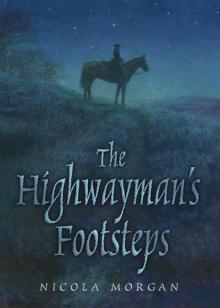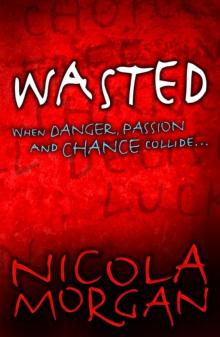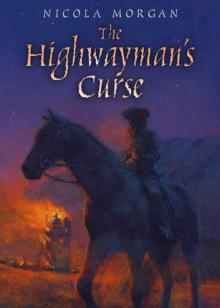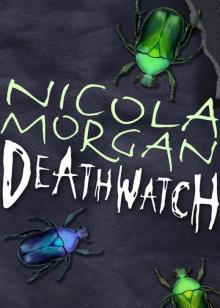- Home
- Nicola Morgan
Wasted
Wasted Read online
NICOLA MORGAN
IMAGINE THE SCENE: Jack and Jess in a club, wrapped up in each other. An enemy, Kelly, waits her moment to spike Jess’s drink. Another girl is outside, trying to get past the bouncer, who may or may not let her in.
He might be distracted or annoyed – such small things can make all the difference. If she gets in, she’ll distract Jess’s friends and they won’t see the drink being spiked. If she doesn’t get in, Jess’s friends will see what happens and save her. The reader sees both scenes, until a coin is tossed and one possibility vanishes. In Wasted, the reader witnesses alternative results unfold and disappear, as the lives of Jack and Jess spin out of control. Finally, it is you who must take the risk and toss a coin to determine the ending. Their lives are in your hands.
Wasted is a startling story of danger, passion and chance by Nicola Morgan, the award-winning author of Fleshmarket and Deathwatch.
You can find out more about Nicola and her books at:
www.nicolamorgan.co.uk
CHAPTER 1
WAITING
JESS is spinning a coin. Not actually playing Jack’s Game yet, because if you’re going to play you have to be very sure. Heads or tails, win or lose, life or death: playing the game changes things and you can’t escape its rules.
She thinks – because she has thought about this quite a lot in the last day and a bit – that if there’s a God, He must play Jack’s Game. There’s not really any other explanation she can think of.
Jess is sitting in a horrible waiting room the colour of old white socks. Waiting. The waiting is awful. It numbs her. Though perhaps waiting for ever would be better than knowing. She wants her guitar, but it wouldn’t exactly be appropriate. You can’t sing in a place like this.
On the floor is a grubby doll with no clothes and one leg. It lies there with blue eyes open. It looks shocked, or dead. There is pen scribbled on its stomach and someone has tried to cut its hair. Jess remembers doing that to a doll once, convinced that it would grow again.
Jess is seventeen years old. Her dad’s a genetic scientist, apparently. Her mum’s an alcoholic. If you tossed a coin, chances are she could take after either or both of them. Trouble is, her dad lives 4,000 miles away and her mum lives next door to her bedroom. This probably alters her chances.
A flash of anger crosses Jess’s mind. She thinks that if she saw the Kelly Gang now she’d want to… But no, best not to think like that. Jess is not prone to violent thoughts. But she is in a state of shock, and strange feelings are stirring. She tries to think about anything else.
The bracelet she’s wearing. A birthday present from her best friend, Chloe. That was a good day: her mum remembered to rustle up a cake – all the way from Mrs Beaton’s Tea Shoppe – and they ate it on the beach, digging their bare heels into the shingle and breathing the seashell air. Her dad phoned and sent the usual money.
But Jess is scared and it’s hard to keep her mind on such things as cake, though she must try. So: it was a fantastic cake; she and her mum used their fingers to scrape the chocolate icing off the wrapping; they have the best cakes in Mrs Beaton’s Tea Shoppe.
If she saw the Kelly Gang now she’d want to kill them. To be honest. Not very nice, but then why should Jess feel nice?
Keep spinning the coin, Jess. It will help. Focus on that coin. Don’t drop it. That’s better.
Jess is trying to make a decision. Does she dare play the game? The sensible part of her knows she shouldn’t. After all, she managed to stop Jack taking it so seriously. But Jack’s Game is serious, and perhaps it’s all she can do now. Maybe all the spirits and gods and everything else that has a say in the world watch when you play Jack’s Game. Maybe that’s what gives it its power. It’s like ancient magic, but with science. According to Jack. Now she is confused and alone and needing him to take the decision away, but when she thinks back to the newspaper stories on his bedroom wall, she knows what he would do. She just can’t decide whether he’s right.
Jess is more than confused and alone. She is barely holding herself together. If she breathes too hard she may shatter into a million pieces.
She glances at the clock. Still spinning the coin. With remarkable skill, considering that she’s only been practising for two weeks. It almost ripples across her fingers, weaving in and out, a life of its own. Left hand as good as the right. That’ll be the piano-playing, and guitar. Someone comes through the door. A woman. Her eyes are puffy. She grips the hand of a bewildered child with chocolate on its face. Jess doesn’t want to look at her, but she’s drawn by her grief. The woman picks up the dead doll and gives it to the child, who grins and grabs it by its remaining leg. Jess thinks that if she was the child’s mother she’d make her daughter clean and dress it and learn how to love it in more ways than just holding on. The door clunks shut and the air settles again.
Jess rummages in her bag and gets out her iPod, plugs her ear-things in and retreats into her music. Their music. The colours wash over her and her senses merge. She closes her eyes, keeps the outside out: the Kelly Gang, the smell, the being really scared. Yesterday. Saturday. Everything. Her mum should be here. Her dad. Someone. A girl shouldn’t be in such a place on her own. But then Jess didn’t tell anyone she was coming so early, so you can hardly blame them.
She opens her eyes suddenly, rips out the ear-things. Breathe slowly, Jess. Almost lost it there. Maybe music is not such a good idea right now, or at least not this particular song. Maybe you should read a magazine. Something shallow, something that won’t slice its way deeper than skin.
Actually, apart from the old sock colour, the room’s not that bad. Soft chairs. Tea and coffee. Free. Plants. A fish tank. They’ve made an effort, just to stop you thinking. Box of tissues. Cushions. You can’t hear sounds from outside, except when the door opens, though there’s a buzzing of air-con. It’s designed to help you forget where you are. So there’s a magazine on sailing and one on houses. And some children’s books and toys. She picks up a board book for babies or toddlers or whatever and looks at pictures of diggers and cranes and just does not allow herself to think of what’s past that door and what will happen when she is told to walk through it.
Probably she will spin the coin soon and play Jack’s Game. After all, a fifty-fifty chance is not that bad. The truth could be a whole lot worse.
CHAPTER 2
POSSIBLY A DEAD BODY
A dead body is a strange thing the first time you see one. It depends how death has struck, of course. From inside or from out. With fire or water or suffocation, disease, poison, any number of things. The body could be broken or whole. If you see it in a morgue they will have used a sheet to cover the broken bits. If possible. Unless it has been damaged by flames, a white person’s body is generally a sort of waxy grey in death. Like a dirty candle that’s too wet to light.
A body that has been washed up from the sea is not the best. This one has already drunk some salty water and is swollen. You don’t really want to look at it too closely. It is greyer than a human should be, fish-like and damp.
Jess has never liked the word “damp”. Nothing damp is attractive.
But wait: this dead body thing has not happened yet. It is the future and therefore may turn out differently. It is one possibility of many. It depends what leads to it. Things need to happen and before that, others.
If we roll the clock back to a time before the dead-body scene, we see Jess somewhere else entirely. Nowhere near this beach beyond the town lights, not running screaming along the shingle towards the human heap that sprawls in the froth, her clothes sticky with sweat and sea-spray and vodka, and grimy with wood smoke.
We see her spinning through the excitement of the leavers’ prom. She is wrapped up in heat and laughter, the heady feeling when she sang her
last long note and the band stopped playing and the cheers rose. Strange hot tears. She will soon head into the night with Jack for the beach party. She has no idea that everything is about to spiral out of control. If it was ever in control.
When it is all over, will she remember the smell of Jack when she buried her face in his neck? How it made her feel faint?
Our story moves too fast. We should roll back to the beginning; except that there never is a beginning. Everything comes from something else. Nothing just happens out of the so-called blue.
For the sake of argument, we will take up the tangled chain of events two weeks ago, two weeks before the possible dead body lies on the beach, two weeks before Jess is in that old-sock waiting room. Maybe, even, she won’t get there. It could all turn out quite differently. Kelly…
Jess and Jack and their friends are hurtling towards what they call freedom. And more choices than they know what to do with.
CHAPTER 3
WHEN JACK MET JESS
THE moment when Jack hears Jess sing so nearly doesn’t happen.
Jess doesn’t know she’s left the door of the music room slightly open. It shouldn’t have been possible, not in the new soundproofed studio with its heavy sprung doors, but it was not exactly unknown for something not to work properly in this school. If the door had been firmly closed, Jess’s voice would have been confined in the room, Jack would have hurried past and Jess would have stayed safely out of his dangerous life.
If Jess hadn’t received a text from Chloe as she was entering the room, she might have taken more care closing the door. Also, there was a brown banana skin on the floor, its smell nastying the warm air, so she’d focused on kicking that aside rather than whether the door was closed.
Besides, she’s been in that studio plenty of times before and the door has always shut without effort. On this occasion, however, perhaps a few extra specks of dust settling on the hinge on a humid day have created just enough tension for the springs to stick. It could have happened the day before, or the day after. Even the cleverest scientist or machine in the world could not have predicted when that door would stick.
None of this would have mattered if Jack hadn’t walked past the door when he did. After all, he shouldn’t have been there. Didn’t even go to Northseas High School. He used to – he’d left to go to a nearby sixth-form college two years ago, the same time Jess had arrived in the area and started at Northseas, so he’d never met her.
So, why is he there? Well, Jack has a band and they have been signed up to play at the leavers’ prom at Northseas. Jack is supposed to be meeting the deputy head to sort out details. He’s signed into reception as a visitor, got his visitor’s ID badge thing, smiled at the receptionist as he agreed that yes, he did still know the way. The receptionist had always liked Jack. A nice boy, she thought, though his hairstyle had now become rather unusual. If she’d been his mother she’d have made him get it sorted, but she suspected that Jack thought that sorted was exactly what it already was. Besides, as everyone knew, he didn’t have a mother.
There are two routes Jack could have taken to the deputy head’s office: the shorter way past the library or the longer way through the music department. He has chosen the longer way, even though he is running late. Why?
You might think: well, he is a musician, drawn to the music department. But this is Jack, this is school, so no, the school music department has no special magnetism for him.
It was Kelly Jones. Walking along the corridor towards him, accompanied by Samantha. They didn’t see him, but they would have if he’d continued that way. There are many unpleasant bits of Northseas High and Kelly and Samantha are extremely prominent on the list of them. There’s a specific reason for Jack wanting to avoid Kelly, but we won’t go into that now. It’s complicated. And uncomfortable to remember. Though Jack does not yet know how important it will become.
For now, he has more pressing stuff on his mind than Kelly. Problems in his band: Janey, the singer, has walked out. At any other time this wouldn’t have mattered. She’d been a pain in the neck anyway, a prima donna with a serious attitude problem, and late for practice most times. Trouble is, it’s only two weeks before the event and Jack’s band has no singer. Jack has decided not to tell the deputy head, Mrs Willow. He’ll find a singer somewhere. The rest of the band said he should tell Willow, but he disagreed. And sometimes there’s something about Jack that makes it hard to argue with him. So, eventually, they let him decide it by tossing a coin. Heads, we tell her; tails, we don’t and something will turn up. And the coin had fallen tails up. Which is enough for Jack, whose life has in the past been ruled by luck so horrible that he reckons he’s used up all the bad fortune he is ever going to have.
Jack knows – believes, trusts, assumes, in a way that looks perhaps like arrogance, endearing optimism or foolish naïveté – that something will turn up. It always seems to if you look for it enough and make the right sacrifices to luck. Lucky Jack, you might say. Though someone whose mother has died twice is hardly lucky.
Anyway, it doesn’t matter whether you call it luck or something else: Jack is walking along the corridor as Jess begins to sing. It is an amazing voice, deep, rich, warm. Very sexy. He doesn’t know the song but he wants to.
He stops and listens. Surely this must be a recording. It cannot be real. Not in a school.
Jess often comes here now. Exams have finished for her, so she doesn’t need to come for classes, but the equipment is here and perhaps she’s clinging to something familiar while she gets used to the strange idea of school being nearly over. A few of her friends are still immersed in exams; the others, like Chloe, have disappeared on weird leavers’ courses designed to prepare them for the “real” world and keep them out of trouble.
But, for Jess, music is not about exams or teachers. It is all of her, or all she wants to think about. She’s written a new song and so she keeps coming to the school’s state-of-the-art recording studio, putting on the headphones and losing herself as she writes it down, makes it just right, getting used to using a mic. The guitar chords are tricky, but she has them almost perfect now and she can let herself go, not needing to think too much about the fingering. She closes her eyes. This is what it would be like to be professional, singing for a career. A swooping feeling clutches at her stomach every time she dreams it.
It’s only when she’s actually singing that Jess can believe this dream. The rest of the time, there seem to be way too many obstacles. Decisions. Should she have applied to music college after all? She’d wanted to, and her teachers had encouraged her but money wasn’t easy and her mum had played that card hard – probably because college meant Jess going away. And Jess knew what her mother felt about that. So she didn’t apply and then she got caught up in exams anyway. She kind of thought that something would turn up, or she’d maybe take a year out, earn some money, go travelling and then think about it again.
The nagging fear of leaving school with no plans was something she brushed away at first – it seemed like another world. But now it doesn’t and the closer it comes, the more Jess is churned by anxiety. Sometimes it makes her dizzy to think about it, especially when she sees her friends get their plans sorted out.
But she feels excitement too. For the freedom. Away from school and exams and rules and some people she’s spent too long looking at every day. Away from home, too, though that isn’t going to be simple. Nothing that involved her mother ever was. Not that she actually wants to think about her mum being on her own. It’s an issue. But, much as she loves her mum, it is not her job to look after her. It should be more her dad’s responsibility. Yeah, right: responsibility. On the other hand, her dad doesn’t know about the drinking. Jess hasn’t told him. She wants to protect her mum, and she knows what he’d say.
Confusing, this. All of it. She is entangled.
Jess’s mum, Sylvia, is what you’d call “needy”. Arty, flighty, moody, fragile. She has a vague rabbit look of fear in her eyes when
they discuss Jess’s future. She’ll start fiddling with her cigarette lighter. And she drinks a lot more than she used to. Or maybe she always used to and Jess didn’t notice before, because Sylvia used to be better at hiding it. But probably it has crept up on Sylvia as gradually as it has dawned on Jess. Neither really wants to face it. Jess wants to think she’s wrong, or that it will solve itself.
When she’s singing, she can forget about all that.
A sound makes Jess jump. She opens her eyes, stops singing halfway through a word, rips the earphones off and glares at the face at the door. A boy is there, looking at her. The door is ajar and he is half inside the room, hair hanging over one eye, mouth open slightly. He has a large mouth. And not in a bad way.
“Hi,” he says. “Look, I’m in a hurry and I just need you to say yes.”
“Who are you?”
“You won’t regret it.”
“I’m regretting it already. What do you want? And it’s probably no, whatever it is. And who are you?”
“I need you.”
She rolls her eyes, flicks the page of her music. But she can’t help a tiny smile inside. She’s only human.
“No,” he holds up his hands, “not in that way. This is not a corny chat-up scenario. I need you in my band. Please say you’re not in a band already.” His skin is smooth, the jaw strong, that smile huge.
“I don’t know anything about you, or your band. No, I’m not. And I don’t know if…”
“Just say yes. Please. I’m desperate. You’ll save me. And you should be in a band. You should be in the best band. Mine.”
“What’s the band?” Jess already knows she is going to say yes, but she will spin it out a bit.
“Schrödinger’s Cats. We’re…”
“You’re playing at the prom!”
“Not without a singer. That’s why I need you. We lost our singer and I’m just going for a meeting with Willow and I’d really like not to have to lie to her. Please. You don’t want me to lie, do you?”

 The Highwayman's Footsteps
The Highwayman's Footsteps Wasted
Wasted The Highwayman's Curse
The Highwayman's Curse Deathwatch
Deathwatch